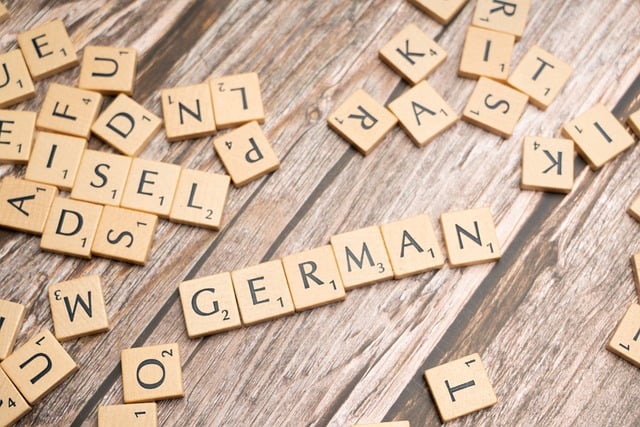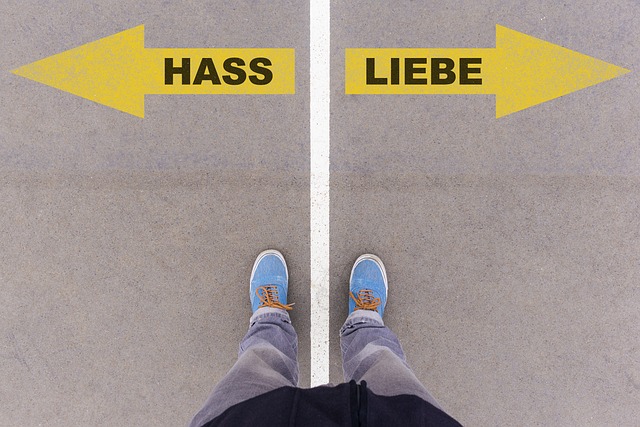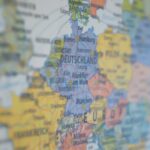Knowing how to pronounce each word you are learning in a new language is vital. This German pronunciation guide will help you with all the information you need for perfect pronunciation. Although much of German pronunciation is straightforward, some sounds are foreign to the native English speaker.
In general, most letters used in German words are pronounced as they sound, albeit with a German accent. There are however some pivotal differences in the way that some letters are pronounced in comparison to English. This guide will discuss these differences and help provide ways to practice sounding like a native German, right from the beginning of your language-learning journey.
The main thing to keep in mind is that the more you listen to spoken German, and practice yourself, the easier and quicker pronunciation will start to become in-built and you won’t have to think about it as much.

German Alphabet Pronunciation
The alphabet is one of the first things to be learned in any language! This might feel a bit silly or pedantic, however, it really is worth spending just a little bit of time looking over the pronunciation of each letter in the alphabet for a new language. This is the same for German pronunciation as well: starting with letters will help you build strong German pronunciation for all words.
Even though the German language uses the Latin-script alphabet (English language alphabet), the pronunciations are different.
Once you’ve worked out the pronunciations of individual letters and letter combinations, learning any new word in German will become a breeze.
Below is a quick reference table for each letter in the language, and how it is pronounced. There will be an elaboration for some of the more tricky pronunciations in this blog. This table here will be a good way to start your way towards German pronunciation.
| German Letter | Phonetic Pronunciation | English Word | German Word |
|---|---|---|---|
| A | ə | car | Apfel |
| B | beh | bed | Brot |
| C | tseh | cat | Computer |
| D | deh | dog | Drache |
| E | eh | bed | Elefant |
| F | eff | fun | Flugzeug |
| G | geh | goat | Garten |
| H | hah | hat | Haus |
| I | ee | see | Insel |
| J | yot | yes | Jacke |
| K | kah | cat | König |
| L | ell | love | Lampe |
| M | em | mom | Maus |
| N | en | not | Nase |
| O | oh | go | Ohr |
| P | peh | pen | Polizei |
| Q | kuh | cat | Quelle |
| R | err | red | Rose |
| S | ess | sit | Sonne |
| T | teh | cat | Tisch |
| U | oo | cool | Uhr |
| V | fow | love | Vogel |
| W | veh | video | Wasser |
| X | iks | box | Xylophon |
| Y | upsilon | yes | Yoga |
| Z | tset | cats | Zeit |
| Ä | eh | air | Äpfel |
| Ö | oo | urn | Öl |
| Ü | ew | unique | Über |
| ß | ess-tsett | kiss | Fuß |

German Special Vowel Pronunciation
The table above will give most of the information you need to pronounce German letters. Some German vowels need a little bit more information to pronounce fully. These are the special symbols that aren’t in the English language, however, they are in more than just the German language. You might also see them in other languages if you continue with your language-learning journey.
A good rule of thumb for these three letters is to start to pronounce the vowel, and then move your sound into an “e”.
| German Letter | Pronunciation | English Word | German Word |
|---|---|---|---|
| Ä | eh | air | Äpfel |
| Ö | oo | urn | Öl |
| Ü | ew | unique | Über |
Ä – Pronounced like the “e” in “bed,” but with a slightly more open mouth position.
Ö – Pronounced like the “u” in “fur,” but with rounded lips.
Ü – Pronounced like the “ue” in “cue,” but with rounded lips.

How To Type German Special Characters
Alongside the standard vowels we know of in English, the German language also has three additional vowels that are as follows:
Ää Öö Üü as well as the special S, ß, which we will discuss in the consonant section of this post.
There are several ways that you can type these symbols on your computer. One is to simply Google “German A letter with umlaut” etc. This will bring up that symbol that you can copy and paste into your writing. This however is quite slow and tedious.
For those who are using a Mac hold down alt and press ‘u’ to bring up the umlaut option. Then simply type the letter that you want to have with an umlaut, either capitalized or not.
For those writing on Windows, the easiest option is to use ASCII codes. Hold down the alt key and then type in the corresponding numbers using your numpad.
| German Letter | ASCII Code |
|---|---|
| ä | Alt + 132 |
| Ä | Alt + 142 |
| ö | Alt + 148 |
| Ö | Alt + 153 |
| ü | Alt + 129 |
| Ü | Alt + 154 |
| ß | Alt + 0223 |
Finally, if all else fails, the easiest way to type these letters is to use two letters instead of one. For any letter with an umlaut, you can simply add an “e” to the vowel. For example, ae is similar for ä. For the German ß symbol, simply write two “s”s symbols.

Consonant Pronunciation In German
Although most of the consonants simply need to be pronounced using a German accent, some letters require a little bit more information upfront to help you on your way.
Learning Pronunciation Using Tongue Twisters
A way of learning to pronounce words and letter combinations in German is through tongue twisters!
These can be very fun, easy-to-remember, methods of learning languages. Each letter will have a brief description of its pronunciation, as well as a tongue twister to help you learn it!
German Letter “J” Pronunciation
The German “J” isn’t pronounced like the English J. Instead it’s pronounced as more of a “y” sound. The easiest way to test this pronunciation is to practice saying the word “ja”. It’s pronounced as “yah”.
You can listen to the sound here.
Tongue Twister: Jagende Jäger jagen jagende Jäge
Hunting hunters hunt hunting hunters.
German Letter “W” Pronunciation
The German “w” is actually pronounced like a “v” sound. This means that the word “wie” isn’t pronounced like the French “oui”, but more like “vee”.
The classic German accent in movies, particularly older movies, is to really emphasize the “v” and “z” sounds. This is where it comes from.
The German word “wie” is very common, and a pronunciation for it can be heard here.
Tongue Twister: Wann wachen wir wieder auf?
When will we wake up again?
German Letter “V” Pronunciation
The German “v” sound is more closely aligned with the English “f” pronunciation. While the “f” in German is also pronounced like an “f”, the “v” is
A good example of the German “v” sound is the word “face” in English. What may make this confusing for new learners is that the “f” in German is also pronounced in a similar manner.
An example of the word in German is the word “vier” and the word “Fisch”. These are two different sounds but can sound quite similar to a non-native speaker.
The pronunciation for “vier” is here.
While the pronunciation for “Fisch” is here.
Tongue Twister: Viele Vögel fliegen über das weite Venn.
“Many birds fly over the vast moor.
German “CH” Pronunciation
The “ch” sound is super important for pronunciation. While in some parts of Germany, it is pronounced as a “k” sound, the more traditional pronunciation, particularly for second language speakers, is the longer “ch” sound. A comparable word in English is the “ch” in “itch”.
You can listen to a word showing this pronunciation here.
Tongue Twister: Der achte achtjährige Affe aß Äpfel auf der Achterbahn.
The eighth eight-year-old monkey ate apples on the roller coaster.
German “SCH” Pronunciation
The “sch” sound is pronounced like the English “sh”. The word “shrink” in English gives a pretty good equivalent of this sound.
A German word that is fairly common is the word “schlafen”. You can hear that pronunciation here.
Tongue Twister: Schwarze Schafe schlafen sicher.
Black sheep sleep safely.
German “EI” Pronunciation
German “ei” and “ie” can sometimes trip up non-native speakers, especially if they are quite new to the language. The trick is that you pronounce the second vowel, not the first one. This means that “ei” is an “i” sound.
A common word that fits this is “mein”. The German pronunciation is similar to the English word “mine”. You can hear that pronunciation in German here.
Tongue Twister: Ein kleines Eichhörnchen liegt im leeren Eimer.
A little squirrel lies in the empty bucket.
German “IE” Pronunciation
As mentioned with the “ei” pronunciation, the pronunciation of the “ie” is the second vowel. This means it is an “e” sound. A good example of this is the word “vier”.
You can hear that pronunciation here.
Tongue Twister: Die Ziege liegt unter der Kiefer.
The goat lies under the pine tree.

Common German Pronunciation Challenges
The biggest two pronunciation challenges are between the “ei” “ie” combination, as well as the “ch” sound. There is quite an easy way to solve this problem, which is using minimal pairs.
Minimal pairs is the pairing of two sounds that are similar, but difficult for non-native speakers to hear. The idea is that you work specifically with these paired sounds to help you differentiate between them and hear the differences.
Many pronunciation mistakes are made simply because as non-native German speakers, we can’t hear what the difference is between two new sounds. This is where minimal pairs play a massive part in helping us learn new languages.
Learning Pronunciation Using Minimal Pairs
The best way to differentiate different sounds of a new language is simply practice. Minimal pairs are the best and most efficient way to practice these new sounds and learn the subtle differences they contain. The best way to do this is to practice minimal pairs with Anki.
Anki often has decks that will help you learn these differences, and I would recommend spending some time with a minimal pairs deck to help with pronunciation.
Another way that Anki can be useful for hearing the sounds of words is through the help of add-ons. These add-ons can say the word on the card in German so that when you are practising the meaning of the word, you are also practising how to say the word using German pronunciation!
You can find a lot more information about Anki in the following post, particularly if you want to know more about addons or how to create a lot of flashcards easily.

Resources For Practicing German Pronunciation
As mentioned above, the use of minimal pairs using Anki or another flashcard app can be pivotal to helping you simply hear the differences in sounds that are foreign to English. This is the first step in being able to say the different sounds.
Another step towards practising German pronunciation is to simply hear it. See if you can find music that you enjoy listening to, that is in German. Once you can start to sing along to the words, you’ll start to pick up the pronunciation of those words at the same time.
Listening to music has the added benefit of helping you say German words in the rhythm of the language.
What I mean by this is that each language has its unique cadence. German speakers speak in a different rhythm than English speakers, and listening to music can help you pick this up and replicate it. Some of the best speakers of other languages are opera singers, for this very reason. They learn to sing the words in smaller sections, which pick up on this rhythm.
One way of picking up music is to use the app called “Radio Garden”. Using this, you can simply find radio stations all across the world and listen in, to hear what kind of music they play. Admittedly there is a bit of English music on some German radio stations which might make this more difficult.
An alternative is to use Spotify or a similar app to listen to German music. Some popular bands include the well-known Rammstein, as well as the Ärzte as well as Toten Hosen. Another well-known band includes Tokio Hotel.
Learning a language using audio is certainly a method you can use. If you’re wanting to know more about this way of learning a language, check out this post here for more information!
Alternatively, speaking with a language tutor, or using conversational AI to help with your pronunciation are other viable methods of language learning. Conversational AI is a relatively new technology and there isn’t too much written about its uses for language learning yet. Check out this post here for some information on this method.

In Summary
While there are some odd pronunciations of the German language, they are not that diverse from English so as to make the language sound completely foreign. This means that while you will still need to learn how to pronounce some letters differently, you can already pronounce some words in German!
Practice, practice, practice to make it perfect! Nothing else can help you learn the language more than practice. Try to make sure that you hear the language while you are learning it, as this will help cement your learning.
- The Ultimate German Pronunciation Guide

- Why German Literature is Essential for Language Learning

- Peculiar Facts About The German Language You May Not Know

- Why Are German Students So Good At Languages (Explained)

- Is The German Language Dying?

- How Easy Is It To Live In Germany Without Knowing German?

- 5 Great Reasons Why The German Langauge May Be Great For You To Learn

- 5 Interesting Aspects Of The German Language You Should Know

- Is German A More Efficient Language Than English? (Answered)










